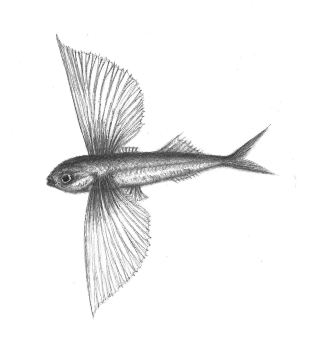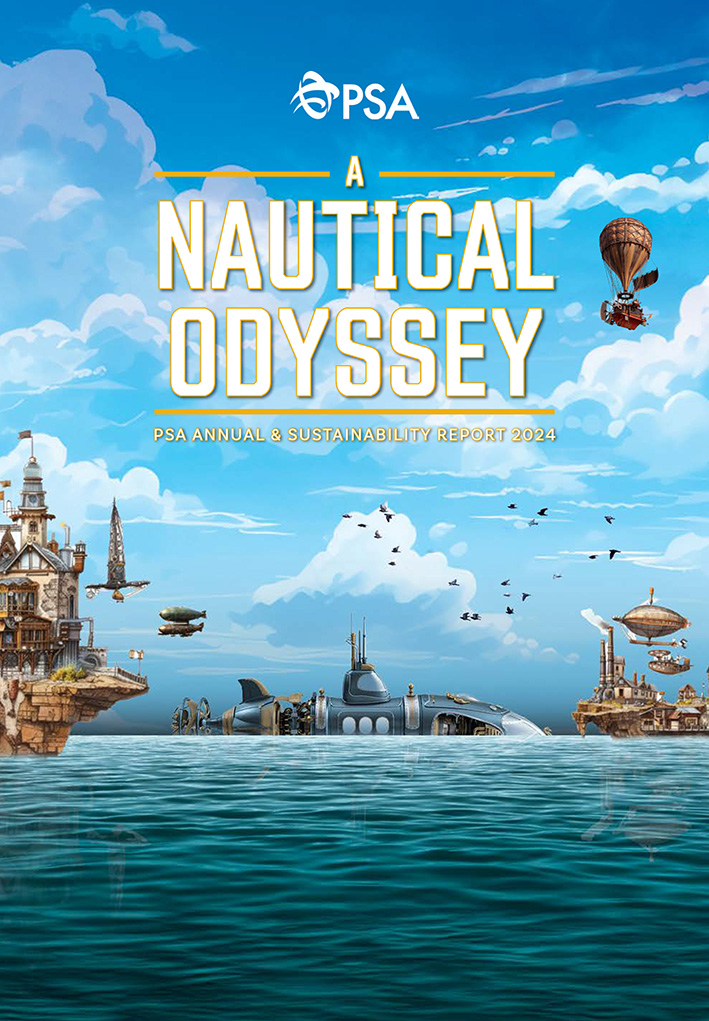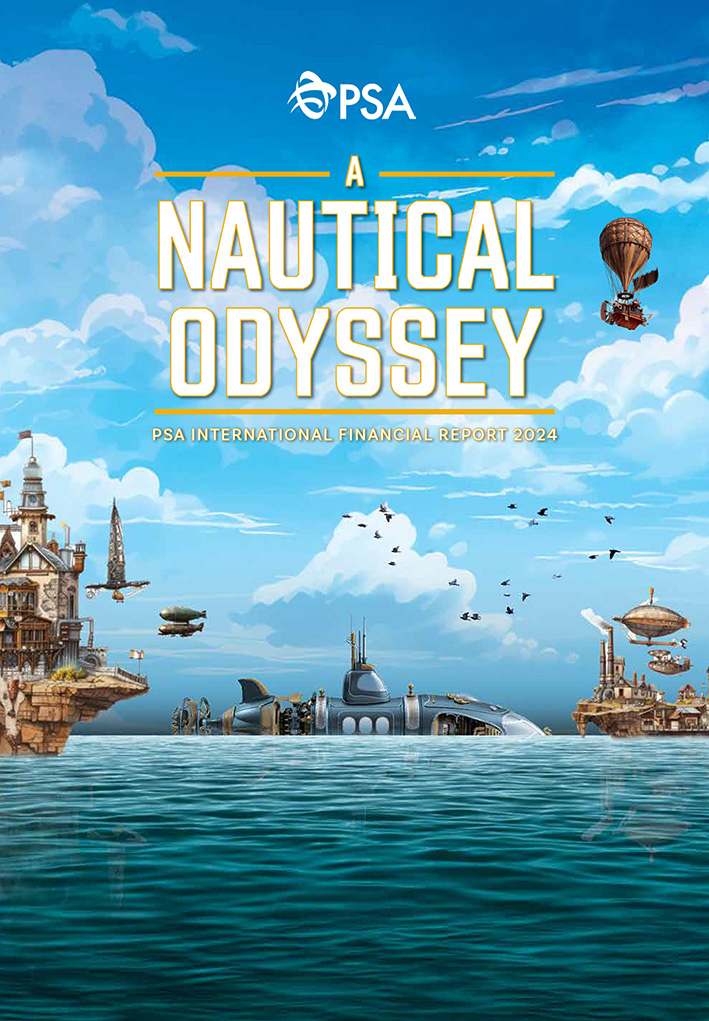2024 was a year of volatility, marked by events that had profound implications for global trade and the supply chain industry. Heightened geopolitical turmoil, shifting trade policies driven by changing governments, and rapid advancements in technology — artificial intelligence and automation — posed significant challenges to the global economy and reshaped businesses and industries.
These global disruptions accelerated demands for the container and supply chain business. PSA adapted with perseverance and took pride in the trust placed in us by stakeholders as we navigated these changes together. In Singapore, for example, we responded to the surge in port hub demand — driven by the Red Sea disruptions — by reactivating berths at Keppel and Tanjong Pagar Terminals, ramping up manpower and commissioning three new berths at Tuas Port to expand our handling capacity.
This agility and resilience resonated across our global network, enabling PSA to reach a world’s first for the year ended 31 December 2024 — handling volumes of 100.2 million Twenty-foot Equivalent Units (TEUs). This marked a 5.6% growth compared to the previous year, with PSA Singapore achieving a record throughput of 40.9 million TEUs (+5.5%), and PSA terminals outside Singapore contributing 59.2 million TEUs (+5.7%). On the supply chain side, PSA BDP handled over 1.6 million shipments for the year.
Guided by our purpose of enabling seamless and sustainable trade, we initiated and centered our efforts towards the Node to Network (N2N) vision — leveraging our combined port facilities, supply chain capabilities and expertise to elevate the performance of terminals, transforming isolated nodes into coordinated networks. This approach drives efficiency in global trade flows essential in today’s dynamic landscape, while fostering greener, more sustainable outcomes.
This inaugural PSA Group Annual and Sustainability Report reflects how sustainability is deeply embedded in every facet of our business — across portfolio, processes and people (culture), as we pursue N2N to shape the future of global trade.
These global disruptions accelerated demands for the container and supply chain business. PSA adapted with perseverance and took pride in the trust placed in us by stakeholders as we navigated these changes together. In Singapore, for example, we responded to the surge in port hub demand — driven by the Red Sea disruptions — by reactivating berths at Keppel and Tanjong Pagar Terminals, ramping up manpower and commissioning three new berths at Tuas Port to expand our handling capacity.
This agility and resilience resonated across our global network, enabling PSA to reach a world’s first for the year ended 31 December 2024 — handling volumes of 100.2 million Twenty-foot Equivalent Units (TEUs). This marked a 5.6% growth compared to the previous year, with PSA Singapore achieving a record throughput of 40.9 million TEUs (+5.5%), and PSA terminals outside Singapore contributing 59.2 million TEUs (+5.7%). On the supply chain side, PSA BDP handled over 1.6 million shipments for the year.
Guided by our purpose of enabling seamless and sustainable trade, we initiated and centered our efforts towards the Node to Network (N2N) vision — leveraging our combined port facilities, supply chain capabilities and expertise to elevate the performance of terminals, transforming isolated nodes into coordinated networks. This approach drives efficiency in global trade flows essential in today’s dynamic landscape, while fostering greener, more sustainable outcomes.
This inaugural PSA Group Annual and Sustainability Report reflects how sustainability is deeply embedded in every facet of our business — across portfolio, processes and people (culture), as we pursue N2N to shape the future of global trade.
ANCHORING OUR PORTFOLIO WITH EXPANDED CAPACITY
Across the year, we continued to expand and future-proof our infrastructure, in addition to enhancing our operational capabilities to better serve our customers.
Tuas Port, the world’s largest automated container terminal, reached new milestones. We broke ground on the PSA Supply Chain Hub @ Tuas, set to commence operations in 2027, and in February 2025, celebrated the handling of 10 million TEUs since operations began in October 2022.
Furthering our strategic partnerships, PSA Singapore and Evergreen Marine Corporation (EMC) established a joint venture in Singapore, which will offer long-term terminal capacity assurance to EMC’s fast-expanding global vessel fleet.
Over in India, PSA Mumbai became the country’s first 100% renewable-powered container terminal, with a 10 MW solar farm supplying over 75% of its electricity. This reduces its CO2 emissions by 16,000 tonnes annually. Phase 2 of the terminal’s expansion commenced operations in February 2025.
In the Middle East, Saudi Global Ports (SGP) increased the handling capacity and efficiency of the King Abdulaziz Port Dammam (KAPD) by commissioning three quay cranes, 18 hybrid Rubber Tyre Gantry cranes and 80 electric prime movers. This reinforces our commitment to greener port operations and strengthens the role of KAPD in serving as Saudi Arabia’s Eastern gateway and as a resilient alternative to affected ports along the Red Sea.
In Türkiye, the first phase of Mersin International Port’s (MIP) East Med Hub 2 expansion project is set for completion in the first half of 2025. This expansion will increase MIP’s annual capacity to 3.6 million TEUs, meeting growing demand as well as creating an expected 500 direct and 5,000 indirect jobs.
In Poland, Baltic Hub laid the cornerstone for its T3 terminal expansion project, which will add a 717-metre long deepwater quay and expanded storage yards. Set to be completed by end 2025, T3 will further solidify Baltic Hub’s position as the leading container hub in the Baltic Sea.
Works have started at Sociedad Puerto Industrial Aguadulce (SPIA) to extend its quay wall and expand its yard. With expected completion in early 2026, the terminal will be the only facility on Colombia’s Pacific Coast capable of accommodating Ultra Large Container Vessels of over 400 metres.
PSA Venice’s 25-year concession extension took effect on 1 October 2024. Separately, Exolgan Container Terminal in Argentina has also been granted a 10-year concession extension. The extension, to start in August 2025, will include berth upgrading plans to accommodate Neo-Panamax vessels.
Tuas Port, the world’s largest automated container terminal, reached new milestones. We broke ground on the PSA Supply Chain Hub @ Tuas, set to commence operations in 2027, and in February 2025, celebrated the handling of 10 million TEUs since operations began in October 2022.
Furthering our strategic partnerships, PSA Singapore and Evergreen Marine Corporation (EMC) established a joint venture in Singapore, which will offer long-term terminal capacity assurance to EMC’s fast-expanding global vessel fleet.
Over in India, PSA Mumbai became the country’s first 100% renewable-powered container terminal, with a 10 MW solar farm supplying over 75% of its electricity. This reduces its CO2 emissions by 16,000 tonnes annually. Phase 2 of the terminal’s expansion commenced operations in February 2025.
In the Middle East, Saudi Global Ports (SGP) increased the handling capacity and efficiency of the King Abdulaziz Port Dammam (KAPD) by commissioning three quay cranes, 18 hybrid Rubber Tyre Gantry cranes and 80 electric prime movers. This reinforces our commitment to greener port operations and strengthens the role of KAPD in serving as Saudi Arabia’s Eastern gateway and as a resilient alternative to affected ports along the Red Sea.
In Türkiye, the first phase of Mersin International Port’s (MIP) East Med Hub 2 expansion project is set for completion in the first half of 2025. This expansion will increase MIP’s annual capacity to 3.6 million TEUs, meeting growing demand as well as creating an expected 500 direct and 5,000 indirect jobs.
In Poland, Baltic Hub laid the cornerstone for its T3 terminal expansion project, which will add a 717-metre long deepwater quay and expanded storage yards. Set to be completed by end 2025, T3 will further solidify Baltic Hub’s position as the leading container hub in the Baltic Sea.
Works have started at Sociedad Puerto Industrial Aguadulce (SPIA) to extend its quay wall and expand its yard. With expected completion in early 2026, the terminal will be the only facility on Colombia’s Pacific Coast capable of accommodating Ultra Large Container Vessels of over 400 metres.
PSA Venice’s 25-year concession extension took effect on 1 October 2024. Separately, Exolgan Container Terminal in Argentina has also been granted a 10-year concession extension. The extension, to start in August 2025, will include berth upgrading plans to accommodate Neo-Panamax vessels.
CHARTING NEW GROWTH IN CONNECTIVITY
In parallel, PSA has actively strengthened our marine services and intermodal solutions — aimed at providing customers with enhanced connectivity via optionality and resilience, while advancing our green objectives.
Development works at Jurong Island Terminal (JIT) are ongoing to meet growing demand from industries on Singapore’s Jurong Island. Expected to be completed in 2025, the upgrading will increase JIT’s annual capacity to 300,000 TEUs, enabling operational efficiencies and an expanded switch from trucking to barging.
Through its joint venture with NFC Co Ltd, PSA Marine received the first four of six new Z-Tech tugboats in 2024. The tugboats will be deployed at Map Ta Phut Industrial Port and Laem Chabang Port in Thailand, fortifying PSA Marine’s position as one of the leading marine service providers in the region.
To bolster our inland logistics offerings and connectivity to Mumbai’s hinterland, PSA India entered a partnership to operate a rail-linked Inland Container Depot (ICD) at the upcoming Multimodal Logistics Park in Indore. PSA BDP also launched a first-of-its kind green transportation solution in Nhava Sheva, with electric trucks linking PSA Mumbai to Dow India’s facilities. The initiative supports the zero-emissions green transport corridor that industry leaders like Dow India can rely on for sustainable and enhanced logistics flows.
Over in Saudi Arabia, SGP is driving the push for intermodal cargo movement to the country’s capital Riyadh, through its Riyadh Dry Port (RDP) Ecosystem nodes — namely, Riyadh Dry Port, Riyadh Empty Yard and Dammam Empty Container Yard. Notably, SGP Riyadh achieved a significant milestone by handling 3 million TEUs since operations commenced in March 2022.
PSA also expanded into Kazakhstan to support trade along the Middle Corridor. Via joint ventures with the national railway company Kazakhstan Temir Zholy (KTZ) and Pegasus Logistics, our digital platforms, Tez Customs and Digital Trade Corridor (DTC), have streamlined cross-border trade, improving speed and efficiency for the logistics community. Additionally, PSA, Global DTC, and the Trans-Caspian International Transport Route (TITR) association inked an agreement to develop the Middle Corridor into a Green Corridor.
In Germany, Duisburg Gateway Terminal (DGT) commenced operations in September 2024. Located in the Port of Duisburg, DGT is set to become both the largest inland container terminal and the largest climate neutral terminal in Europe.
Development works at Jurong Island Terminal (JIT) are ongoing to meet growing demand from industries on Singapore’s Jurong Island. Expected to be completed in 2025, the upgrading will increase JIT’s annual capacity to 300,000 TEUs, enabling operational efficiencies and an expanded switch from trucking to barging.
Through its joint venture with NFC Co Ltd, PSA Marine received the first four of six new Z-Tech tugboats in 2024. The tugboats will be deployed at Map Ta Phut Industrial Port and Laem Chabang Port in Thailand, fortifying PSA Marine’s position as one of the leading marine service providers in the region.
To bolster our inland logistics offerings and connectivity to Mumbai’s hinterland, PSA India entered a partnership to operate a rail-linked Inland Container Depot (ICD) at the upcoming Multimodal Logistics Park in Indore. PSA BDP also launched a first-of-its kind green transportation solution in Nhava Sheva, with electric trucks linking PSA Mumbai to Dow India’s facilities. The initiative supports the zero-emissions green transport corridor that industry leaders like Dow India can rely on for sustainable and enhanced logistics flows.
Over in Saudi Arabia, SGP is driving the push for intermodal cargo movement to the country’s capital Riyadh, through its Riyadh Dry Port (RDP) Ecosystem nodes — namely, Riyadh Dry Port, Riyadh Empty Yard and Dammam Empty Container Yard. Notably, SGP Riyadh achieved a significant milestone by handling 3 million TEUs since operations commenced in March 2022.
PSA also expanded into Kazakhstan to support trade along the Middle Corridor. Via joint ventures with the national railway company Kazakhstan Temir Zholy (KTZ) and Pegasus Logistics, our digital platforms, Tez Customs and Digital Trade Corridor (DTC), have streamlined cross-border trade, improving speed and efficiency for the logistics community. Additionally, PSA, Global DTC, and the Trans-Caspian International Transport Route (TITR) association inked an agreement to develop the Middle Corridor into a Green Corridor.
In Germany, Duisburg Gateway Terminal (DGT) commenced operations in September 2024. Located in the Port of Duisburg, DGT is set to become both the largest inland container terminal and the largest climate neutral terminal in Europe.
POWERING NEW COMPETENCIES
Digitalisation is a key driver in strengthening our investments in terminals and port adjacencies, enabling synergistic port ecosystems and enhancing supply chain connectivity. Through continued development and scaling of our suite of digital solutions, PSA is unlocking new value, driving efficiency and advancing sustainability within individual nodes and across networks.
For instance, PSA Singapore’s OptETruck solution, a proprietary cloud-based transport management solution, garnered a “Recognition of Excellence” at the 9th Annual Singapore OpenGov Leadership Forum. PSA also launched its OptETracker tool to provide transparent tracking and reporting of greenhouse gas (GHG) emissions, which will be deployed in the Middle Corridor.
In September 2024, CrimsonLogic became a wholly-owned PSA subsidiary, reinforcing its role as a digital enabler for the Group — across areas such as port, technology and infrastructure-related projects, as well as cybersecurity. During the year, CrimsonLogic strengthened its digital trade facilitation portfolio through strategic contract wins in Singapore and the Middle East, while its Integrated Risk Management solution topped the “Analytics-Logistics” category at the Singapore Business Review Technology Excellence Awards 2024.
Complementing the launch of its new Carbon Dashboard, PSA BDP announced its commitment to the Science Based Targets initiative (SBTi) in November 2024 — a recognised framework that provides defined pathways for companies to reduce GHG emissions. With over 98% of PSA BDP’s emissions derived from the transportation of freight, this focus will help PSA BDP’s customers achieve their own reduction targets.
For instance, PSA Singapore’s OptETruck solution, a proprietary cloud-based transport management solution, garnered a “Recognition of Excellence” at the 9th Annual Singapore OpenGov Leadership Forum. PSA also launched its OptETracker tool to provide transparent tracking and reporting of greenhouse gas (GHG) emissions, which will be deployed in the Middle Corridor.
In September 2024, CrimsonLogic became a wholly-owned PSA subsidiary, reinforcing its role as a digital enabler for the Group — across areas such as port, technology and infrastructure-related projects, as well as cybersecurity. During the year, CrimsonLogic strengthened its digital trade facilitation portfolio through strategic contract wins in Singapore and the Middle East, while its Integrated Risk Management solution topped the “Analytics-Logistics” category at the Singapore Business Review Technology Excellence Awards 2024.
Complementing the launch of its new Carbon Dashboard, PSA BDP announced its commitment to the Science Based Targets initiative (SBTi) in November 2024 — a recognised framework that provides defined pathways for companies to reduce GHG emissions. With over 98% of PSA BDP’s emissions derived from the transportation of freight, this focus will help PSA BDP’s customers achieve their own reduction targets.
PROPELLING OUR PEOPLE AND CULTURE
Building on our long-standing FISH initiative, we continue to foster a positive and supportive workplace culture. People are our greatest asset and we strive to develop our employees by strengthening their Capability (scope), Competency (depth), and Capacity (stretch).
Our commitment to lifelong learning is embodied in our training arm, PSA University, which offers diverse courses to support professional and personal growth. This included our new environmental sustainability module in 2024, ‘Greenfish III’, which keeps employees informed about global sustainability regulations and the role of data in achieving carbon emission targets.
Through Employee Opinion Polls and talent management programs such as Short-Term International Development Experience (STRIDE) and the Global Management Associate Program (GMAP), we empower employees to reach their full potential.
We also reaffirmed our commitment to strong organisational governance by refreshing PSA’s Code of Business Ethics and Conduct (The Code) for employees and the Suppliers’ Code of Conduct with expanded guidelines. This dovetailed with the launch of PSA’s Customer and Partner (CP) Business Principles, outlining standards of ethical conduct expected from customers, business partners, and other third parties.
Our commitment to lifelong learning is embodied in our training arm, PSA University, which offers diverse courses to support professional and personal growth. This included our new environmental sustainability module in 2024, ‘Greenfish III’, which keeps employees informed about global sustainability regulations and the role of data in achieving carbon emission targets.
Through Employee Opinion Polls and talent management programs such as Short-Term International Development Experience (STRIDE) and the Global Management Associate Program (GMAP), we empower employees to reach their full potential.
We also reaffirmed our commitment to strong organisational governance by refreshing PSA’s Code of Business Ethics and Conduct (The Code) for employees and the Suppliers’ Code of Conduct with expanded guidelines. This dovetailed with the launch of PSA’s Customer and Partner (CP) Business Principles, outlining standards of ethical conduct expected from customers, business partners, and other third parties.
SETTING SAIL FOR A GREENER AND BETTER FUTURE
Trade flows are the lifeblood of the global economy — fuelling markets, driving growth, and connecting communities worldwide. Today, ports are more vital than ever, not only as key facilitators of the global economy but also as stewards of long-term sustainability.
I want to pay tribute to our pioneer generations, whose foresight and foundational efforts have paved the way for PSA’s growth. I am also deeply grateful to our management, staff and unions for their dedication and drive; to our Board of Directors for their invaluable guidance and leadership; and to our shipping line partners, global customers, and the local communities we serve for their unwavering trust and collaboration.
As Team PSA, we recognise the profound impact of our work — influencing economies and shaping the future of trade. Guided by our N2N vision, we will remain steadfast in our purpose and alongside like-minded partners, build a seamless and sustainable global trade — not just for today, but for generations to come.
I want to pay tribute to our pioneer generations, whose foresight and foundational efforts have paved the way for PSA’s growth. I am also deeply grateful to our management, staff and unions for their dedication and drive; to our Board of Directors for their invaluable guidance and leadership; and to our shipping line partners, global customers, and the local communities we serve for their unwavering trust and collaboration.
As Team PSA, we recognise the profound impact of our work — influencing economies and shaping the future of trade. Guided by our N2N vision, we will remain steadfast in our purpose and alongside like-minded partners, build a seamless and sustainable global trade — not just for today, but for generations to come.

Ong Kim Pong













